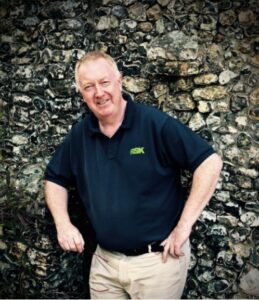Construction engineering company RSK Group has embarked on a fascinating expansion campaign – particularly since the beginning of 2023.

Since January, the Cheshire-based company is understood to have executed in the region of 15 mergers and acquisitions (M&A) with companies from a range of different sectors – oftentimes overseeing several in quick succession in a matter of weeks.
Presiding over their company’s long-term growth strategy is a normal, and even necessary, responsibility of a chief executive – but it is difficult to match RSK CEO Alan Ryder when it comes to the (seemingly unpredictable) diversity of his company’s ever-expanding operations, particularly within a UK construction business.
Whether Ryder’s choices are inspired, or even directly relate to the construction industry, is another matter – they are nonetheless endlessly intriguing and provide food for thought on the importance of brand flexibility and remaining agile to meet customer expectations, while also managing risk and company culture during a period of aggressive expansion.
‘Lily pads on a pond’
RSK Group currently comprises more than 175 businesses and employs somewhere in the region of 11,000 people across several countries. Its annual turnover at the end of FY22 was £796 million.
In a recent interview with the Financial Times, Ryder said of his company’s recent growth he wants to run the largest provider of “sustainable solutions” in the world, relying on the “cross-fertilisation of ideas and expertise”.
He added he views the myriad businesses within his company as lily pads on a pond, each an “individual pocket of expertise” whose real benefit reaches its full potential when “one lily pad abuts another”, thus creating an intersection of ideas and a unique offering for his customers.
And he seems to be tenaciously holding to that principle…
Aggressive expansion

As of 13 June, RSK had overseen the acquisition of at least 12 companies since the new year. Since then, however, it has added three more businesses to its portfolio, taking the total to (as of now) 15 mergers since January, further illustrating the pace at which Ryder is cultivating his unique ‘botanical ecosystem’.
Between 15-22 June, RSK acquired ARA Architecture in Devon, Scottish energy and carbon capture specialists Axis, and industrial and infrastructure asset management expert, The Woodhouse Partnership Limited (TWPL).
The first was founded in 1969, and offers architectural design through to construction management services to the housing, leisure and commercial sectors. The latter, founded in 1994, operates in more than 30 countries, including the UK, US, Colombia and Brazil.
And the acquisition of a company like Axis is certainly timely with the UK Government recently awarding its first round of carbon dioxide storage licences, and shortly after chancellor Jeremy Hunt pledged £20 billion for CCS in his Spring Budget.
Prior to this, RSK acquired railway engineering business, 1stinrail, marking the Group’s expansion into the rail infrastructure sector. In April, it acquired CX Group, a group of three specialist companies working in the energy sector.
Prior to that the Group acquired Calibrate Energy Engineering, a provider of commercial heating and chilling systems, near Bamburgh, in Northumberland.
And before that it announced the acquisition of Hawkins Electrical, an electrical service firm based in Lincolnshire, Southern Ecological Solutions (SES), an Essex-based ecological, arboriculture and landscape design consultancy, and geotechnical specialist 4AP-Geoteknik in Hadsten, Denmark.
In recent months, RSK also added to its ever-growing portfolio of companies, temporary site service company WysePower, market research agency BMG Research, marine geoscience consultancy Hydrofix, tree and vegetation management firm Treefellers Ltd, mineral exploration and ground investigation contractor Irish Drilling Limited, and technical facilities management and energy solutions firm Richard Irvin FM.
Also noteworthy is that in most instances, including with the recent Axis, ARA, and TWPL acquisitions, RSK leaves in place incumbent management of the recently acquired business to continue leading their company and staff – retaining that expertise and connection Ryder seems keen to preserve and cultivate.
Ryder, now in his 60s, also told the FT RSK seeks out businesses grown by their founders, who are perhaps thinking of stepping back a bit and transferring responsibility, but who also feel the ‘need to do something with their company’ – an approach not dissimilar to business magnate and Berkshire Hathaway CEO, Warren Buffett, who also allows the businesses he acquires to retain a degree of branding and autonomy long after they are absorbed by his.
To illustrate the point, National Highways recently appointed ground investigation contractor and RSK subsidiary, Structural Soils, to its £1.3 billion A66 Northern Trans-Pennine project, where it will act as principal contractor on what is thought to be the ‘largest ground investigation project in the UK to date’.
Structural Soils was founded in 1964 and became part of RSK Group in 2007. And while RSK rightly celebrated this massive achievement, it was also quick to acknowledge the equal importance of Structural Soils managing director Stephen Mackereth and his team for their unique expertise and collaboration on the project, or, the other lily pads in the RSK pond.
Enjoyed this? Try Spencer Group innovation used on $730m bridge in Canada
Get industry news in 5 minutes!
A daily email that makes industry news enjoyable. It’s completely free.
